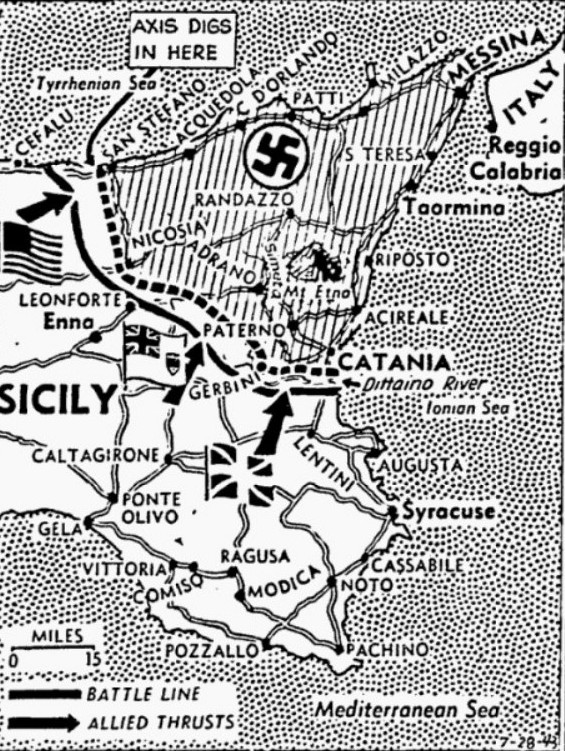Germans digging in –
Allies in Sicily drive 15 miles
Americans take Cefalù; Canadians advance
By Virgil Pinkley, United Press staff writer
Allied advance of 15 miles in North Sicily today brings the invasion forces approximately to the positions shown by the black line on the map. Axis forces were digging in along a front (broken line) from San Stefano to below Catania.
Allied HQ, North Africa –
U.S. and Canadian troops have advanced the main Allied offensive line 15 miles eastward in Sicily, front reports said today.
The Canadians, the reports said, were driving forward against bitter opposition, trying to pierce the center of the German defenses.
Official announcements said that the Americans had occupied Cefalù, north coast harbor 35 miles east of Palermo, and with other troops from the center, had taken Petralia, Polizzi Generosa and Alimena.
Germans digging in
Front reports said that the Germans were digging in on a solid line beginning at San Stefano on the north coast, running south and east through Nicosia and Catenanuova and along the Dittaino River to the east coast.
The Germans massed for a pitched battle to hold their last one-eighth of the island. They were reported sandwiching Italian troops among their units, but only for labor rather than fighting.
The major Allied line now runs from below Catania on the east coast to Cefalù on the north coast, although advance U.S. units were considerably past the latter port. A German stand was expected along the Dittaino River against the British 8th Army.
Italian divisions escape
It was learned that two Italian field divisions, that were nearly trapped in the American drive that captured Palermo, had managed to withdraw eastward toward Messina. This made at least eight Axis divisions known to be still in the field on Sicily.
Gen. Dwight D. Eisenhower’s communiqué said activity on the eastern front where the British 8th Army faced German units before Catania had fallen off to patrol action and that the American front on the left flank was static.
Twenty-four hours earlier, units from the U.S. 7th Army had joined with the Canadians to break up an attempted German counterattack in the center.
While the 8th Army was held up temporarily by the stiffened German defenses south of Mt. Etna on the east coast, front reports said German losses in that area were running as high as 50% for some battalions.

